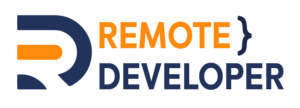A remote developer team brings incredible opportunities—access to global talent, increased flexibility, and reduced overhead costs. But let’s be real, remote work isn’t always smooth sailing. Without face-to-face interactions, teams can struggle with miscommunication, missed deadlines, and a lack of connection.
So, how do you build a remote developer team that thrives? The answer lies in creating a culture of clear communication, seamless collaboration, and strong team support. In this guide, we’ll break down three powerful strategies to help you lead a high-performing remote development team that’s productive, motivated, and engaged.
Master Communication for a Strong Remote Developer Team
When working remotely, poor communication can lead to confusion, delays, and frustration. That’s why setting up clear, structured communication is crucial to keep your team aligned and efficient.

Define Your Communication Channels
Not every conversation requires a meeting, and not every update should get lost in an email thread. Use the right platform for the right purpose.
- Instant messaging enables quick questions, casual updates, and team bonding.
- Video calls facilitate deep discussions, brainstorming sessions, and one-on-ones.
- Project management tools help track tasks, assign responsibilities, and maintain accountability.
- Document collaboration platforms centralise knowledge-sharing and version control.
- Asynchronous updates reduce unnecessary interruptions and respect different time zones.
Set Clear Expectations for Response Times
Ever waited hours (or days) for a reply? That’s a productivity killer. Setting expectations avoids delays and keeps the workflow moving.
- Urgent issues should receive an immediate response to prevent critical disruptions.
- Regular inquiries should follow a standard 24-hour response window to maintain steady communication.
- Deep-focus work should encourage “do not disturb” time for coding and problem-solving.
- Escalation procedures should be in place to resolve pressing concerns quickly.
- Team availability guidelines should be clear to accommodate different time zones.
Keep Meetings Short & Purposeful
Nobody wants back-to-back Zoom meetings. Streamline your calls to make them efficient and engaging.
- Daily stand-ups (10–15 mins) provide quick updates on progress, blockers, and priorities.
- Weekly check-ins align the team on major projects and upcoming goals.
- Monthly retrospectives offer a chance to review processes, address challenges, and improve workflows.
- Ad-hoc troubleshooting calls help resolve urgent technical issues.
- Office hours provide structured time for open discussions and mentoring.
Foster Clear & Concise Messaging
In a remote developer team, clear writing is as important as clear coding. Avoid long, vague messages.
- Use bullet points for easy readability.
- Get straight to the point—no fluff, just facts.
- Encourage async updates so developers can read messages at their own pace.
- Provide templates for standard requests to streamline communication.
- Avoid jargon or ambiguity to ensure clarity across diverse teams.
Train Your Team in Remote Communication
Not everyone is naturally great at remote communication. Help your team improve their skills.
- Offer training on effective writing and messaging.
- Teach active listening skills for video calls.
- Share best practices for digital etiquette.
- Conduct workshops on conflict resolution in remote settings.
- Encourage feedback loops to refine communication processes over time.
Create a Culture of Collaboration in a Remote Developer Team
A remote team isn’t just a group of people working separately—it’s a unit that needs to collaborate seamlessly. Without a strong culture of teamwork, silos form, productivity dips, and innovation stalls.

Utilise Effective Collaboration Tools
A remote developer team needs the right digital tools to collaborate efficiently.
- Use code collaboration platforms to track changes, merge branches, and review code seamlessly.
- Implement project planning systems to assign tasks, monitor progress, and meet deadlines.
- Maintain a centralised knowledge base to store important resources and improve accessibility.
- Leverage shared whiteboards for brainstorming and technical discussions.
- Automate repetitive workflows to improve efficiency.
Foster Pair Programming & Code Reviews
High-quality code is a result of collaboration and continuous learning.
- Encourage pair programming to help developers share knowledge and identify issues early.
- Conduct regular code reviews to ensure quality and maintain coding standards.
- Facilitate technical discussions to exchange ideas, solve challenges, and drive innovation.
- Rotate code reviewers to ensure fresh perspectives.
- Implement coding mentorship programs for continuous skill improvement.
Build a Culture of Continuous Feedback
Feedback should be frequent, constructive, and actionable.
- Use retrospectives to discuss what’s working and what needs improvement.
- Encourage a blame-free culture where developers feel safe to share mistakes.
- Implement peer reviews to create a cycle of continuous improvement.
- Establish structured feedback mechanisms for performance evaluations.
- Promote open discussions to refine team processes.
Standardise Development Workflows
Consistency prevents chaos. Define clear processes for how your remote developer team works.
- Use coding standards and best practices to maintain code quality.
- Implement CI/CD pipelines for smoother deployments.
- Maintain clear version control rules to avoid conflicts.
- Define sprint planning guidelines to align development goals.
- Establish testing protocols to catch bugs before deployment.
Hold Virtual Co-Working Sessions
Sometimes, just working together in silence can boost motivation and productivity.
- Host optional co-working Zoom sessions where devs can work “together” virtually.
- Organise team coding challenges to keep things engaging.
- Encourage cross-team collaboration on open-source or internal projects.
- Set up hackathons to drive innovation and skill-sharing.
- Use virtual coffee chats to strengthen team bonds.
Support Your Team’s Well-Being & Work-Life Balance
A burnt-out team is an unproductive team. If you want long-term success, you need to support your developers’ mental well-being. A healthy, motivated team leads to better performance and retention.

Promote Work-Life Balance
Remote work should mean freedom, not endless hours at the desk.
- Respect work hours—no late-night messages or weekend tasks.
- Encourage regular breaks to prevent fatigue.
- Offer flexible schedules to accommodate different time zones and personal needs.
- Limit unnecessary meetings to reduce cognitive overload.
- Promote time-off policies to prevent burnout.
Recognise & Celebrate Successes
Remote teams often miss out on casual “good job” moments. Make sure achievements are recognised.
- Shout out wins in team meetings and Slack.
- Implement a reward system—bonuses, career growth opportunities, or learning stipends.
- Encourage peer recognition so teammates can appreciate each other’s work.
- Celebrate project milestones with team-wide acknowledgements.
- Provide career advancement opportunities based on contributions.
Keep the Team Connected Beyond Work
A strong remote developer team isn’t just about work—it’s about building genuine relationships.
- Host virtual game nights to bond over fun activities.
- Set up casual chat channels for non-work discussions.
- Plan in-person meetups when possible for deeper connections.
- Organise interest-based groups to encourage shared hobbies.
- Celebrate personal milestones like birthdays and anniversaries.
Offer Mental Health & Wellness Support
Mental health matters, especially in a remote setting where isolation can be an issue.
- Provide access to mental health resources like counselling or wellness programs.
- Encourage transparent discussions about stress and workload management.
- Promote a culture that values well-being over hustle culture.
- Offer mindfulness and stress-management workshops.
- Support work-life integration strategies for better balance.
Invest in Professional Growth
Developers thrive when they keep learning and growing.
- Provide access to online courses, certifications, and mentorship.
- Support career path discussions to align goals with company needs.
- Encourage knowledge-sharing sessions to keep everyone updated on industry trends.
- Offer conference sponsorships for skill-building.
- Establish structured learning plans tailored to team needs.
Conclusion
Building a high-performing remote developer team isn’t just about hiring great talent—it’s about creating an environment where they can thrive. By focusing on clear communication, strong collaboration, and team well-being, you can unlock productivity, engagement, and long-term success.
Ready to take your remote developer team to the next level? Contact us now and let’s build something great together!

